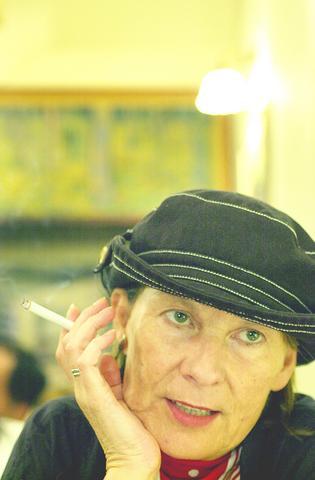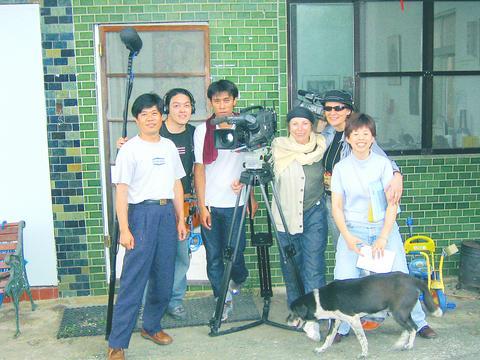Last month in Hamburg, a documentary film called The President's Belly -- recording the election campaign and post-election protests -- was shown to an audience of 200 people.
The film documented the emotional events and happenings, such as the 228 Hand-in-Hand human chain rally, the party concerts, the night after the shooting of Chen Shui-bian (
The film provides an on-the-spot documentary from an European point of view of that dramatic month, from Feb 28 to the end of March. What amazed the audience in Hamburg, as well as director Monika Treut herself, was the energy and passion Taiwanese people demonstrate toward politics.

PHOTO: SEAN CHAO, TAIPEI TIMES
One-and-half-years ago, Monika Treut, a distinguished German filmmaker known for her works challenging the limits of gender and sexuality, considered herself as an European. But now, she thinks of herself as being a little Taiwanese. When she talked to me at a cafe near National Taiwan University, she drank Taiwan beer, smoked Long Life cigarettes and carried a mobile phone with Taiwanese Aboriginal totems attached.
"For me, the most fascinating part of Taiwanese culture is the mixture of all cultural influences, the Portuguese, the Japanese, the US influences, and the political impact of the KMT in the past, and now people trying to find a new identity as Taiwanese," she said.
In September 2002, Treut was invited by organizers of the Women Make Waves Film and Video Festival (

PHOTO COURTESY OF PTS
"The people and their lives I've seen are wonderful and I've decided that I'd make a film about Taiwan," Treut said.
For Treut, the best way to illustrate Taiwan's unique quality is to mix the cultures and colors of life through telling stories of Taiwanese women.
In fact, The President's Belly is more like a prelude to Treut's feature-length film, temporarily titled Tiger Women Grow Wings.
The film marks the first German-Taiwan co-production venture, with Treut's Hyena Films, German Culture Ministry and Taiwan's Public Television Service (
The film, which she has just finished shooting, tells about the lives and stories of Taiwanese women from three generations. Three outstanding women, author Li Ang (
Treut refers to"Tiger Women" becauuse Taiwan is known as a "tiger economy." This, she said, also can refer to women's strength confronting hardships in life. The title is also a play-with-words on the Chinese idiom "like tigers grow wings" (
"In a way, growing wings means these women are free and independent from the traditional constrains," Treut said.
Making portraits of strong women has always been a motif of Treut's filmmaking. In the past Treut has made documentaries about dominatrix and actress Eva Norvind, provocative feminist professor Camille Paglia and human rights activist Yvonne Bezerra de Mello working in the slums of Rio de Janeiro. Now, it's the turn of three Taiwanese women.
Hsieh Yue-hsia, the 62 year-old Taiwanese opera actress and the winner of the 2002 Golden Bell Awards (Taiwan's answer to Emmy Awards), represents the senior generation of Taiwanese women going through economic hardships in the 1960s. The film crew traces Hsieh to her childhood as an adopted daughter forced to learn opera to make a living from the age of five. From the age of 16, Hsieh started to play male parts on stage and became popular among women fans. She is also the mother of four children.
Li Ang, one of Taiwan's leading authors about women in the 1980s, also deals with the themes of sexuality and the conflict between modern Western values and Confucian ethics. The film crew follows Li to her hometown Lukang (
Lastly the film focuses on DJ Chen, the first-time filmmaker of recent hit Formula 17 (
Having spent six weeks in Taiwan and having finished two films, Treut is now back in Hamburg to do post-production for the films. Asked what she missed most about working in Taiwan and with a Taiwanese team, she said it was the working style and ethics of Taiwan.
"The working ethic is very similar to that of old Germany. People here are devoted to work and very efficient. Of course, younger Germans are not like this anymore," she said.

Taiwan has next to no political engagement in Myanmar, either with the ruling military junta nor the dozens of armed groups who’ve in the last five years taken over around two-thirds of the nation’s territory in a sprawling, patchwork civil war. But early last month, the leader of one relatively minor Burmese revolutionary faction, General Nerdah Bomya, who is also an alleged war criminal, made a low key visit to Taipei, where he met with a member of President William Lai’s (賴清德) staff, a retired Taiwanese military official and several academics. “I feel like Taiwan is a good example of

March 2 to March 8 Gunfire rang out along the shore of the frontline island of Lieyu (烈嶼) on a foggy afternoon on March 7, 1987. By the time it was over, about 20 unarmed Vietnamese refugees — men, women, elderly and children — were dead. They were hastily buried, followed by decades of silence. Months later, opposition politicians and journalists tried to uncover what had happened, but conflicting accounts only deepened the confusion. One version suggested that government troops had mistakenly killed their own operatives attempting to return home from Vietnam. The military maintained that the

Before the last section of the round-the-island railway was electrified, one old blue train still chugged back and forth between Pingtung County’s Fangliao (枋寮) and Taitung (台東) stations once a day. It was so slow, was so hot (it had no air conditioning) and covered such a short distance, that the low fare still failed to attract many riders. This relic of the past was finally retired when the South Link Line was fully electrified on Dec. 23, 2020. A wave of nostalgia surrounded the termination of the Ordinary Train service, as these train carriages had been in use for decades

Lori Sepich smoked for years and sometimes skipped taking her blood pressure medicine. But she never thought she’d have a heart attack. The possibility “just wasn’t registering with me,” said the 64-year-old from Memphis, Tennessee, who suffered two of them 13 years apart. She’s far from alone. More than 60 million women in the US live with cardiovascular disease, which includes heart disease as well as stroke, heart failure and atrial fibrillation. And despite the myth that heart attacks mostly strike men, women are vulnerable too. Overall in the US, 1 in 5 women dies of cardiovascular disease each year, 37,000 of them